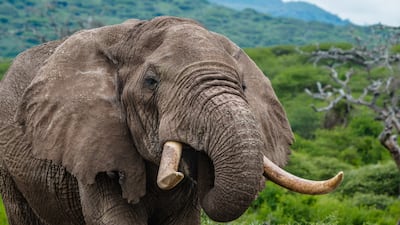There’s a saying within the Great Plains organisation: “We don’t shout from mountains, we whisper from hilltops.”
Which means that despite running high-end Relais & Chateaux-endorsed safari lodges in some of the most stunning spots in Africa, the company remains quietly focused on working behind the scenes to conserve and expand natural habitats, and support local communities in the areas where it operates.
Even with its latest initiative, the $90,000 Royal Safari, which will include private jet transfers, stays at Burj Al Arab and a host of exclusive wilderness experiences in Kenya, Botswana and Zimbabwe, the end game is conservation.
The ultra-high-end itinerary will run next year from Sunday, September 25 to Friday, October 7. It will start with two nights in Dubai, where guests will stay at one of the world’s most recognisable hotels. Beyond setting the tone for the rest of the trip, Burj Al Arab was chosen because of what it represents, explains Great Plains global ambassador Lance Dixon.
“The reason we selected Burj Al Arab is it represents the brand of Dubai, and its vision. And we felt that a 20 to 50-year vision is essential when you are having a conversation around conservation, because of the rate of decline of habitat and wildlife populations," says Dixon. Much like the development of the UAE, successful conservation requires a long game, where goals are set and then doggedly pursued.
While in Dubai, guests will be able to choose from a suite of bespoke experiences, including helicopter and seaplane tours, desert safaris and visits to the Gold Souq. On the morning of Tuesday, September 27, travellers will be transported via helicopter from the helipad of the Burj Al Arab to the VIP terminal of Dubai International Airport, where they will board a private Emirates Executive jet.

“I think what this does is put the Emirates brand front and centre on the global conservation stage. Because the conversation we are having in the background is one of carbon neutrality. This safari is going to be carbon neutral, but it is opening a broader door to how we can work with airline partners to offset their carbon footprint,” Dixon explains. Great Plains controls about 600,000 hectares of densely planted raw wilderness across Africa, which gives it significant carbon offsetting potential.
The safari’s first stop is Kenya’s Maasai Mara, where guests will spend three nights between three Great Plains properties, including the Relais & Chateaux Mara Plains Camp, and Mara Nyika. With the trip coinciding with the great migration, bountiful wildlife experiences are all but guaranteed. “The wildlife in that area is just extraordinary,” says Dixon. “It’s mind-boggling, what people can see in a short space of time.”
Private game drives, remote field dining and a potential hot air balloon ride are all on the agenda, but guests may also just want to enjoy the luxury surroundings of the camps themselves, where the association with Relais & Chateaux ensures that cuisine is an important part of the experience.
Next on the itinerary is Botswana’s Okavango Delta, known for its sprawling grassy plains and seasonal floods, which give rise to a lush, dramatic habitat. The Duba Concession, where Great Plains’ Selinda and Duba Plains camps are located, is described by Dixon as “one of the most prized wildlife concessions in the whole of Africa”.
“It is a dramatically different space to Kenya,” he says. “There are rivers and tiny lagoons, and you’ll see herds of buffalo or lions in the water.”

The third and final destination is Zimbabwe, where activities will centre on Victoria Falls and Mana Pools National Park. Guests will spend their last two nights on the banks of the Zambezi River, at the Tembo Plains camp. “That’s another great success story because it’s a reserve that was formerly a hunting space that Great Plains took over four or five years ago," says Dixon. "Since we’ve been there, there has been no hunting and the rehabilitation of the animals has been extraordinary.”
There’s only space for 14 people on the trip – 10 principles, who will pay $90,000, and four ambassadors, who will pay $70,000 but will “have a deliberate interest and focus on being part of the conversation going forward” and will become “spokespeople for how we combine conservation and sustainability into all our itineraries”.
The safari, in its entirety, is an opportunity for guests to see and participate in the work that Great Plains is carrying out as it protects vital wilderness areas across the continent. Beyond that, the goal is to raise $120,000 from the trip, for the Great Plains Foundation. This will be invested in acquiring 10 Starlink satellite terminals, an initiative from Elon Musk’s SpaceX that aims to provide global broadband connectivity. The amount will also be used to plant 1,000 indigenous trees, and set up 10 solar-powered water wells, which will be distributed across the Great Plains communities.
After the successful completion of the debut Royal Safari, the aim is to operate two itineraries in 2023 and six in 2024, eventually raising $1 million per year for the Great Plains Foundation.
“Great Plains is boutique, it’s intimate, it’s extraordinarily exclusive and it’s very humble at the same time. We don’t stand on ceremony, we are deeply respectful of the environment and of our communities. Our lodges are very small, intimate spaces. And yet, it’s a solid organisation. For example, the work we do with relocating rhinos is breathtaking stuff," says Dixon.
"And so the Royal Safari is simply a way of bringing that conversation to the world stage. But there’s more to it than taking a bunch of wealthy people on safari. It is about having a real conversation about sustainability and about returning tourism to the host nations.”


